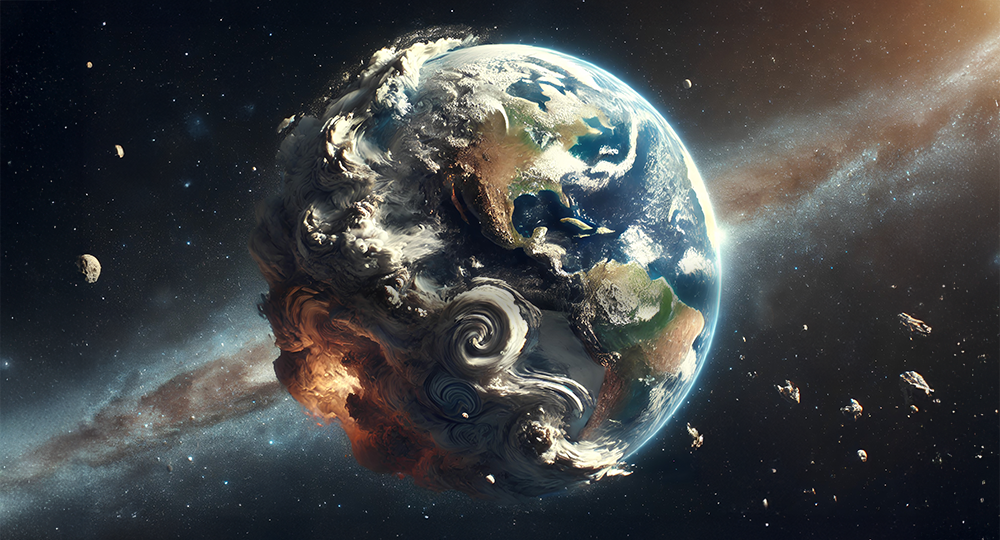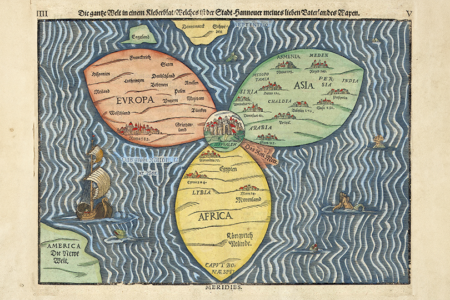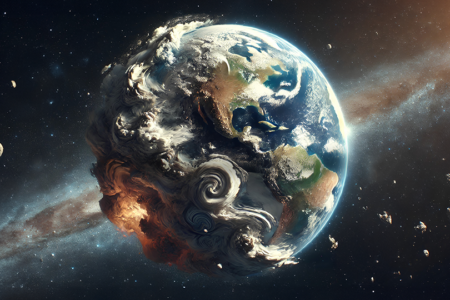Out With the Old World, In With the New
Scoffers deliberately ignore biblical truth. Yet, the truth is that a great conflagration is coming, as prophesied in 2 Peter 3.
It’s amazing how destructive a fire can become. On September 2, 2018, Brazilians were devastated by the dissolution of their cultural heritage when a raging blaze consumed Brazil’s 200-year-old National Museum in Rio de Janeiro. Almost 93% of the museum’s 20 million items were destroyed. One politician described the fire as “a lobotomy of the Brazilian memory.”1
As damaging as this fire was to Brazil, it hardly compares to the universal incineration that someday will sweep the entire earth. The apostle Peter forewarned, “Both the earth and the works that are in it will be burned up” (2 Pet. 3:10). This staggering event will not merely be a “lobotomy” of memory but an obliteration of the world and its legacy of corruption. It will occur during what the Bible repeatedly calls the “day of the LORD” (Isa. 13:6, 9).
The Context
In 2 Peter 3:10, the apostle Peter spoke of the coming Day of the Lord. Verse 10 is the last time the phrase appears in Scripture. Peter was expressing concern that his fellow Christians might lose their steadfastness (or foothold) in their faith, and he wanted them to be on guard continually (v. 17).
On guard for what? For error. Throughout Peter’s second epistle (3:1), he warned his readers about false teachers who would bring in “destructive heresies” (2:1) and cautioned them not to let these wicked people lead them into error and away from the truth (3:17).
One of these errors is to deny or cast doubt on the promise of Christ’s return to Earth. Peter said these false teachers will appear in the last days as scoffers, or mockers (v. 3). They will mock the doctrine of Jesus’ Second Coming because so long a time already has passed, and nothing has really changed since the “beginning of creation”2 (v. 4).
However, he pointed out that scoffers deliberately ignore the fact that, at one time in Earth’s history, God used water to create a cataclysmic upheaval that changed everything (vv. 5–6). The global flood of Noah’s day (Gen. 6—9) serves as a template for another, future, cataclysmic event known as the Day of the Lord.
Theologians differ as to the meaning of the phrase Day of the Lord in Scripture. Some see it as a technical term referring to a specific period during the last days. Others see it more as a concept referring to events or periods at any time in history. Either way, most agree the term always entails God’s direct intervention in history through divine judgment and destruction, occasionally accompanied by divine restoration.
Peter’s use of Day of the Lord in 2 Peter 3:10 matches how the phrase is used elsewhere in Scripture.
Divine Judgment and Destruction
Peter focused on a specific aspect of the Day of the Lord: the complete elimination of the present heavens and earth. This future event parallels the one in the book of Revelation where “the earth and the heaven fled away. And there was found no place for them” (Rev. 20:11).
The words there was found no place imply they will be totally done away with.3 Although Peter and the apostle John, who penned Revelation, agree in this regard, Peter gave more details as to how and why this phenomenon will transpire.
Peter said the present heavens and earth are actually being kept for a future event, namely, “the day of judgment and perdition [destruction] of ungodly men” (2 Pet. 3:7). This is an allusion to the Great White Throne Judgment in Revelation 20, where all of the unsaved, those whose names are not found in the Book of Life, are judged according to their lifetime deeds to determine the degree of their punishment (Lk. 12:47–48). Then they are thrown into the everlasting Lake of Fire (Mt. 18:8; Rev. 20:12, 15).
When the day of judgment and destruction arrives, the heavens and earth will be destroyed by fire (not water this time), having been reserved for that end (2 Pet. 3:7). This Day of the Lord will come suddenly and ruinously, like a thief. The heavens will “pass away” (v. 10), or disappear (same word as in Rev. 21:1), after being put to the torch and reduced to its melted parts—all of which will occur with a great rushing noise, like “something passing with great force and rapidity.”4
The basic elements of all creation,5 down to the smallest-known subatomic particles called quarks, will be dissolved by intense heat; and “both the earth and the works that are in it will be burned up”6 (2 Pet. 3:10).
All these things will occur during a transition period between the Millennial Kingdom (Christ’s 1,000-year reign on Earth) and the eternal state,7 which Peter called the “day of God” (v. 12) or “forever” (literally, “day of eternity”; v. 18).
Sequentially, then, these are the events following the Millennial Kingdom:
1. Satan is freed from his prison for a final, doomed revolt against the worldwide reign and rule of Israel’s Messiah Jesus (Rev. 20:7–10).
2. The resurrection of the unsaved dead takes place from the sea, death, and Hades (Rev. 20:13).
3. The Day of the Lord conflagration burns up the heavens and earth (2 Pet. 3:7, 10–12). (This could happen either simultaneously with the resurrection of the unsaved dead or slightly after it.)
4. The Great White Throne judgment occurs and the consequent Lake of Fire finality.
5. Divine restoration takes place (new heavens and new earth).
Divine Restoration
After the divine judgment and destruction, divine restoration will come, as God promised (2 Pet. 3:13).
Peter said it is “because of” the coming of the day of God, the eternal state, that the present heavens and earth must be destroyed to make room for the new heavens and new earth (vv. 12–13).
The idea of new heavens and a new earth is not unique to Peter. Both the prophet Isaiah and the apostle John predicted them (Isa. 65:17; 66:22; Rev. 21:1).
The prophet Isaiah said they both will be so glorious that “the former [heavens and earth] shall not be remembered or come to mind” (Isa. 65:17). John delineated the conditions of the new entities more than Peter did (Rev. 21:1—22:5); but Peter made a significant observation: In the new heavens and new earth, “righteousness dwells” (makes itself at home, 2 Pet. 3:13).
What to Do?
Bearing in mind that these events will definitely transpire, Peter challenged us by asking the question, “What manner of persons ought you to be in holy conduct and godliness?” (v. 11). In other words, how should we live as Christians in the here and now?
We are not to become like the mockers and doubt God’s promises. Instead, we are to remember them (3:2–9, 13). We should not forget that God measures time differently than we do. Therefore, we shouldn’t give up on God simply because we think it takes too long for Him to keep His promises (vv. 8–9). If God delays, it is to provide salvation for more people (v. 15).
Finally, we’re to “be diligent to be found by Him in peace, without spot and blameless” (v. 14) and to “grow in the grace and knowledge of our Lord and Savior Jesus Christ” (v. 18), all the while “looking for and hastening [being zealous for] the coming of the day of God” (v. 12).
The National Museum of Brazil is still trying to rebuild. God, on the other hand, will rebuild quickly and easily; and His restoration will be glorious and righteous. In light of the crime and corruption that characterize the world today, that promise is truly something to look forward to.
ENDNOTES
-
-
- Dom Phillips, “Brazil museum fire: ‘incalculable’ loss as 200-year-old Rio institution gutted,” The Guardian, September 3, 2018 (tinyurl.com/rioB-fire).
- This is basically the argument for uniformitarianism, which is a geologic “doctrine suggesting that Earth’s geologic processes acted in the same manner and with essentially the same intensity in the past as they do in the present and that such uniformity is sufficient to account for all geologic change.” See Encyclopaedia Britannica, britannica.com, s.v. “uniformitarianism.”
- Some theologians say the heavens and Earth will not be annihilated but, rather, scoured or cleansed by fire.
- Frederick William Danker, ed., “ῥοιζηδόν,” A Greek English Lexicon of the New Testament and Other Early Christian Literature, 3rd ed. (based on Walter Bauer’s Griechisch-Deutsches Worterbuch zu den Schriften des Neuen Testaments und der ubrigen urchristlichen Literatur, 6th ed. and previous English editions by W. F. Arndt, F. W. Gingrich, and F. W. Danker (Chicago, IL: University of Chicago Press, 2000), 907.
- Some expositors say the Greek word for “elements” refers to the celestial bodies, not the basic elements of all matter.
- There are Greek textual variants for “burned up” that Greek scholars find difficult to resolve.
- Transitions, not unknown in eschatology, also occur between the Rapture and the beginning of Daniel’s 70th week (the Tribulation; inferred by Dan. 7:8), as well as between Christ’s Second Coming and the beginning of the Millennium (12:11–12).
Photo: Adobe Stock
-








